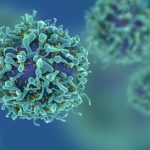There’s no topic like cancer to inspire cacophonous claims of a cure, pegged to everything from the rinds of fruits nobody has ever eaten to powders drawn from Micronesian beaches no one has ever visited. As such, claims of miracle cures for cancer typically cause the medical establishment to roll their eyes and avert their attention.
This is why it’s so important to eschew such cure-related hyperbole when discussing the cancer-treating components of cannabis, which could all too easily be lumped into the same National Enquirer “wonder cure” category.
Such talk is especially counterproductive given that there is little doubt that cannabis plays a very important role as a treatment option for cancer—a fact even government agencies are ready to acknowledge, issuing statements on cannabis and cancer that are profoundly encouraging.
The National Cancer Institute has said that “Cannabis has been shown to kill cancer cells in the laboratory.” (Presumably it does something similar outside of the laboratory, but taking cannabis from lab to bedside is an exercise in Schedule-I bureaucratic frustration.) In addition, the NCI states that “[c]annabinoids appear to kill tumor cells but do not affect their non-transformed counterparts and may even protect them from cell death.”
Anecdotes of success in treating cancer with cannabis can’t be ignored—they’re what’s driven the medicalization of cannabis for a long time.
This is because cannabis is what’s known as “pro-apoptotic.” Apoptosis means that a cell commits suicide. Cannabis encourages this in some cancer cells while protecting non-cancer cells from the same fate. As any oncologist will tell you, killing cancer cells while not affecting normal tissue is one of the Holy Grails of treatment. Cannabis can also prevent cancer cells from further dividing, spreading, and growing.
Even the National Institute of Drug Abuse—an organization historically devoted to vilifying cannabis—has gotten on board, stating that “marijuana extracts may help kill certain cancer cells and reduce the size of others.” Not even they can ignore the science.
Anecdotes of success in treating cancer with cannabis can’t be ignored—they’re what’s driven the medicalization of cannabis for a long time. But anecdotes aren’t enough to support touting cannabis as a miracle cure. As always with cannabis and its 144 cannabinoids, the range of effects and variations is vast. Medical cannabis is still the wild west. One size simply does not fit all. There are just too many permutations.
So let it be said, loudly and often: Cannabis is not a cure for cancer. It is not a panacea that has been evilly suppressed by greedy pharmaceutical corporations.
Exaggerations such as these do nothing but sabotage the potential of cannabis. T-shirts emblazoned with “Cannabis Cures Cancer” and assorted leafy greens simply give the appearance of Rastafarian snake oil.
Let’s not further embolden biased clueless conservatives, who look for reasons to further vilify cannabis and stigmatize cannabis users. Now is the time for common sense and reason rather than common screech and rhetoric. Overcoming stigma means reversing ideas that are all too often loosely formed yet firmly held.
Progress in cannabinoid science is truly exciting and packed with great promise If we are to advance, the focus needs to be on objective science and studies. Let’s keep it that way.
(1180)





Leave A Reply